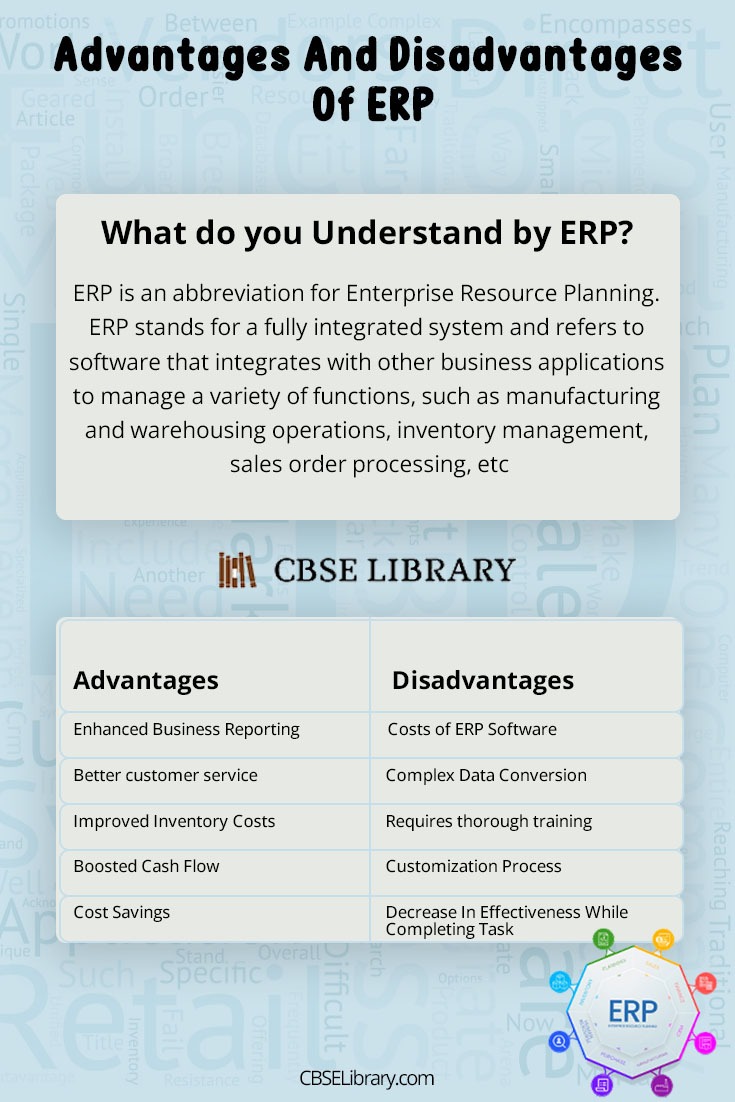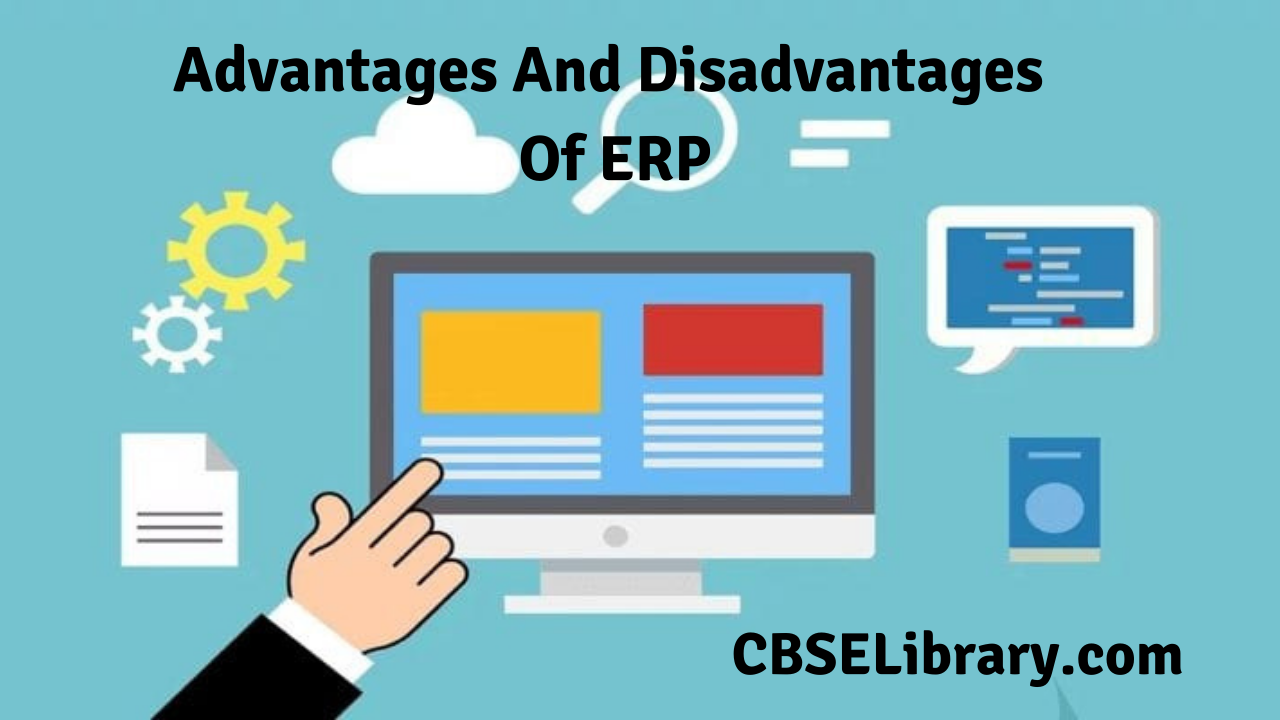Advantages And Disadvantages Of ERP: Intended to make the job of an entrepreneur much easier, ERP (Enterprise Resource Planning) software allows you to integrate all parts of your business into one cohesive program that streamlines your daily operations and planning processes. But like with any piece of software, there are advantages and disadvantages to using it in your company. Here are five advantages and disadvantages of ERP software that you should be aware of before deciding whether or not to implement it in your business.
Students can also find more Advantages and Disadvantages articles on events, persons, sports, technology, and many more.
- Advantages of ERP
- Disadvantages of ERP
- Comparison Table for Advantages And Disadvantages Of ERP
- FAQ’s on Advantages And Disadvantages Of ERP
What do you Understand by ERP?
ERP is an abbreviation for Enterprise Resource Planning. ERP stands for a fully integrated system and refers to software that integrates with other business applications to manage a variety of functions, such as manufacturing and warehousing operations, inventory management, sales order processing, etc.
- It has been shown that businesses save millions each year in areas like inventory control and customer management by using ERP software.
- Furthermore, many companies have implemented ERP on top of their legacy systems which has provided even more benefits in terms of streamlining processes while ensuring consistency across diverse departments. Furthermore, it is important to note that ERP software is not a silver bullet solution for all businesses.
- It requires a significant amount of resources (financial and human) to implement an ERP system properly which may not be feasible for smaller organizations with limited budgets or inflexible business models. In addition, some people argue that these costs are simply passed onto consumers who ultimately pay higher prices for goods or services.
Advantages of ERP
Today’s businesses are far more complex than they used to be. Success depends on keeping everything organized in a way that lets them operate effectively, efficiently, and profitably. The right enterprise resource planning (ERP) software helps you meet these goals. Here are five advantages of choosing an ERP system
Enhanced Business Reporting: One of ERP’s biggest advantages is that it makes it easier to get reports on your business. You can see how every aspect of your business is performing, from inventory to customer service. It’s easy to identify areas where you need to make improvements or changes.
Better customer service: When you have all your business information in one place, it’s easier to serve customers. You can see what they want when they want it, and where they want it. This lets you provide better customer service than you could with a manual system.
Improved Inventory Costs: If you rely on a manual system, it’s easy to lose track of inventory. If you have to use customer inventories for your reports, you’ll have inaccurate information about what you actually have on hand. You won’t know how much to produce, or how much to order when supplies run low. That can result in higher costs that cut into your profits.
Boosted Cash Flow: An automated system helps you keep track of your cash flow. You can see how much money is coming in, where it’s going, and when you need to make payments. This makes it easier to spot potential problems before they become serious issues.
Cost Savings: An automated system can help you cut costs. You won’t have to spend as much time doing paperwork, so you can focus on growing your business. That means you’ll save money on labor costs. It also means you’ll save money by eliminating mistakes that would otherwise lead to costly errors.
Disadvantages of ERP
ERP systems are a good investment for companies looking to streamline their operations. But companies that think installing an ERP system will solve all their problems will find themselves struggling to adapt over time as they learn more about how different aspects of business work together. It’s best not to get caught up on just one piece of software or application but instead, keep your focus on why you’re implementing it in the first place.
Costs of ERP Software: The biggest disadvantage of any software or application is its cost. It’s easy to get caught up in thinking about all that your new system will do for you, but it’s important to remember that any investment will come with a price tag. When you think about how much money you’re spending on your ERP system, it can be easy to forget why you chose it in the first place.
Complex Data Conversion: One of the biggest challenges with any new software or application is converting your data. It’s easy to forget that many companies have years, if not decades, worth of data that needs to be converted from your old system to your new one. The more complex your system is, and the more intricate your data is, then the longer it will take to convert everything over.
Requires thorough training: Training your employees on how to use your new system is another important step in making sure everything goes smoothly. Just like you can’t expect someone to pick up a new language overnight, it takes time for people to become familiar with their new software or application.
Customization Process: One of the most important things to remember about any software or application is that you can’t expect it to be perfect right out of the box. While many companies offer customization services, it’s important to remember that these take time and money.
Decrease In Effectiveness While Completing Task: An important thing to remember about any software or application is that it’s only as good as its user. If you don’t understand how your system works, then you won’t be able to use it effectively. The more complex your system is, the there are more ways for users to make mistakes while using it.

Comparison Table for Advantages And Disadvantages Of ERP
| Advantages | Disadvantages |
| Enhanced Business Reporting | Costs of ERP Software |
| Better customer service | Complex Data Conversion |
| Improved Inventory Costs | Requires thorough training |
| Boosted Cash Flow | Customization Process |
| Cost Savings | Decrease In Effectiveness While Completing Task |
FAQ’s on Advantages And Disadvantages Of ERP
Question 1.
What is an ERP and how does it work?
Answer:
A software application that helps companies manage their inventory, logistics, sales, distribution, and supply chain processes. These applications can be cloud-based or on-premises. Some key benefits include integration of your business data into a single system to improve business processes, increase visibility into company performance across divisions, reduce time to market products/services and provide higher customer satisfaction through better customer service through real-time information.
Question 2.
What is an example of an ERP system?
Answer:
One such example is SAP, a German-owned software application provider that specializes in business software applications including human resource management, financial accounting, supply chain management, customer relationship management and analytics applications.
Question 3.
Is ERP easy to learn?
Answer:
Yes, ERP software is very intuitive for all users. Once an employee is oriented to their role in your company’s ERP system, they will be able to use it effectively. It requires minimal training time and can save companies a significant amount of money in labour costs related to business processes that were previously managed manually.
Question 4.
Is Microsoft 365 an ERP?
Answer:
Yes, Microsoft 365 can function as an ERP system when all components are implemented (such as Microsoft Project, SharePoint, Excel and Word). Microsoft 365 gives users access to business applications across a single platform, which makes them more productive than if they had to use multiple systems.
Conclusion on Advantages And Disadvantages Of ERP
In conclusion, it is important to note that there are many advantages and disadvantages to every type of software available. If a person is looking for specific features or if they want something in particular, then there will be an application that works best for them. It really just depends on what their needs are. With such a wide range of software available today, it’s easy to find an application that suits your business perfectly.
